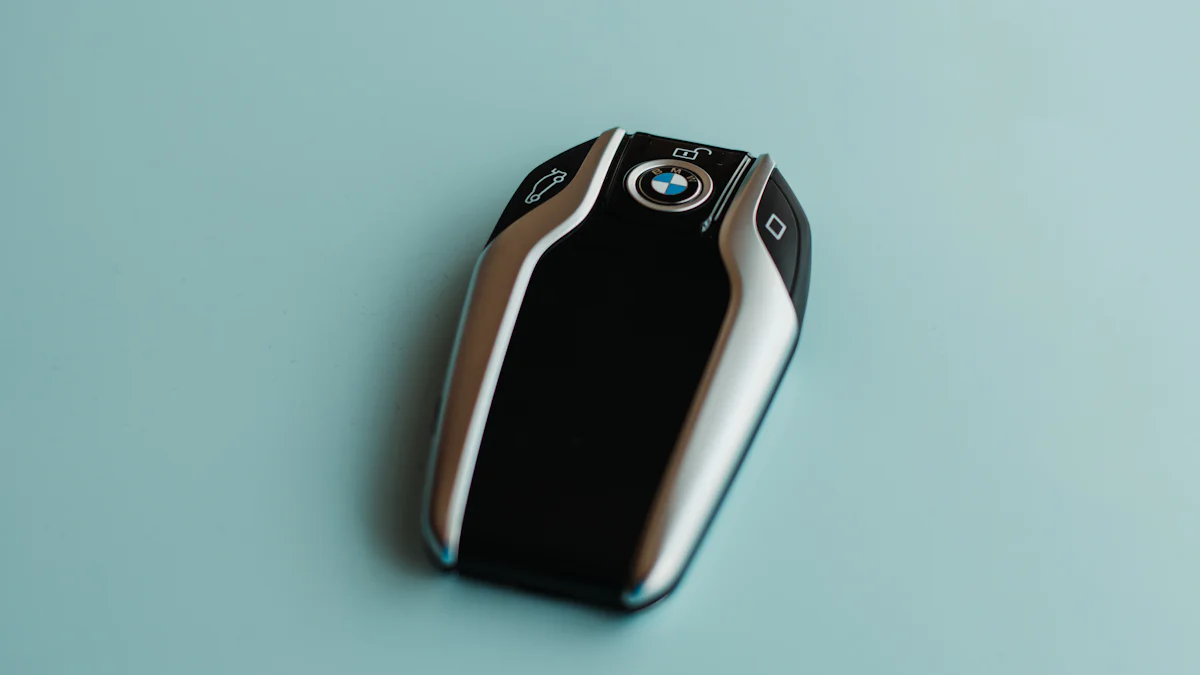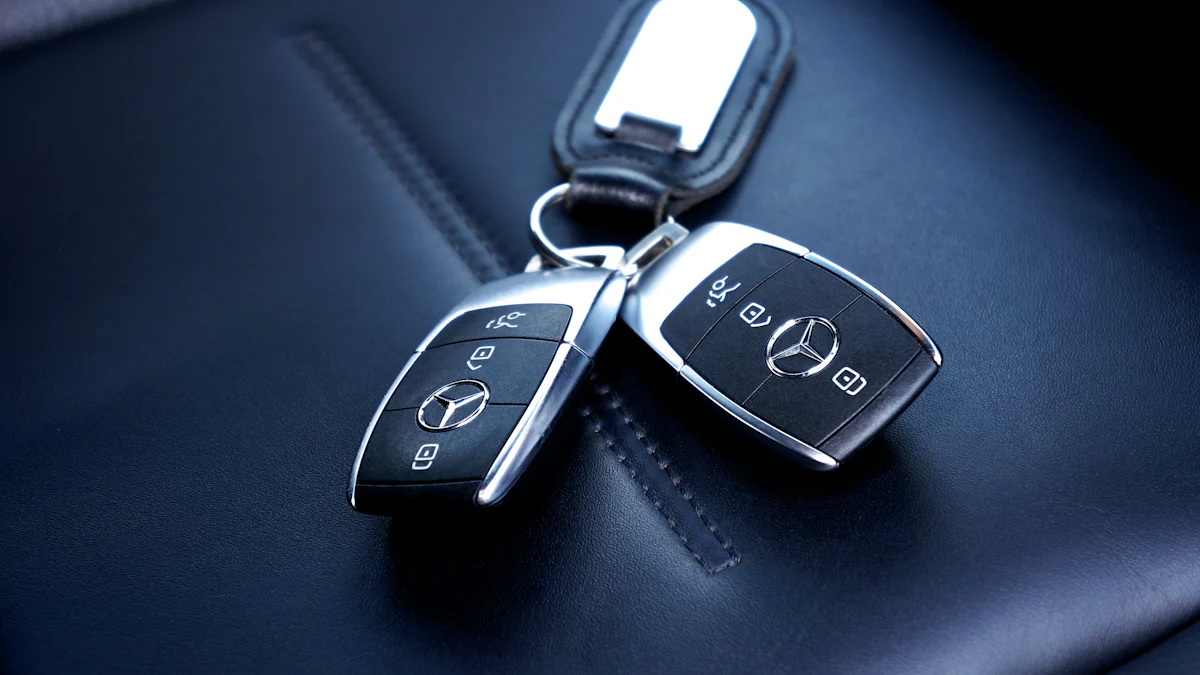What is a Smart Key?

A smart key is an electronic access and authorization system for vehicles. Modern vehicles often include smart keys to enhance security and convenience. Understanding what is a smart key helps in recognizing its role in vehicle safety. A car key with smart technology allows for remote actions like locking, unlocking, and starting the vehicle. The LCD smart car key represents the latest advancement in this technology.
Understanding Smart Keys

Definition and Overview
What is a Smart Key?
A smart key is an advanced electronic device for vehicle access and authorization. Smart keys enable remote actions like locking, unlocking, and starting the vehicle. The technology behind smart keys includes sensors and microchips. These components work together to provide enhanced security and convenience.
Historical Background
The concept of smart keys emerged in the late 1990s. Early versions offered basic remote functions like locking and unlocking doors. Over time, advancements in technology led to more sophisticated features. Modern smart keys now include capabilities such as keyless entry and push-button start.
Components of a Smart Key System
Key Fob
The key fob serves as the primary interface for the smart key system. Users carry the key fob to interact with the vehicle. The key fob contains buttons for various functions like locking and unlocking doors. Some key fobs also feature a panic button for emergency situations.
Antenna
The antenna plays a crucial role in the smart key system. It transmits signals between the key fob and the vehicle. Multiple antennas may be placed around the vehicle for better signal reception. The antenna ensures seamless communication for various smart key functions.
Electronic Control Unit (ECU)
The Electronic Control Unit (ECU) manages the smart key system. The ECU processes signals from the key fob and antennas. It verifies the authenticity of the key fob before granting access. The ECU also controls other vehicle functions related to the smart key.
How Smart Keys Work
Communication Technology
Smart keys use radio frequency identification (RFID) technology. The key fob sends a unique signal to the vehicle's antenna. The antenna then relays this signal to the ECU. This process ensures secure communication between the key fob and the vehicle.
Authentication Process
The authentication process involves multiple steps. First, the key fob sends an encrypted signal to the vehicle. The ECU receives and decrypts this signal. If the signal matches the stored data, the ECU grants access. This multi-step process enhances vehicle security.
Vehicle Access and Start Mechanism
Smart keys allow for keyless entry and ignition. Users can unlock the vehicle by simply approaching it with the key fob. The vehicle detects the key fob's presence and unlocks the doors. For starting the vehicle, users can press a button instead of inserting a key. This feature adds convenience and ease of use.
Comparison with Traditional Keys and Keyless Entry Systems
Traditional Keys
Mechanical Functionality
Traditional keys rely on a mechanical system. A physical key must be inserted into the lock to unlock the vehicle. The key must also be inserted into the ignition to start the car. This method requires manual effort from the user.
Security Features
Traditional keys offer basic security features. The key's unique cut pattern prevents unauthorized access. Some traditional keys include immobilizer technology. This technology disables the engine if the wrong key is used. However, traditional keys are vulnerable to lock picking and duplication.
Keyless Entry Systems
Basic Functionality
Keyless entry systems use electronic signals. A key fob sends a signal to the vehicle to unlock the doors. Users can press a button on the key fob to lock or unlock the car. Keyless entry systems eliminate the need for a physical key.
Security Features
Keyless entry systems provide enhanced security. The system uses encrypted signals to prevent unauthorized access. Some keyless entry systems include rolling codes. Rolling codes change the signal each time the key fob is used. This feature makes it harder for thieves to intercept the signal.
Smart Keys vs. Traditional Keys
Convenience
Smart keys offer greater convenience compared to traditional keys. Users can unlock and start the vehicle without inserting a key. The smart key allows for remote actions like locking and unlocking the car. Traditional keys require manual effort and physical insertion.
Security
Smart keys provide advanced security features. The system uses encrypted signals and authentication processes. Traditional keys rely on mechanical locks and immobilizers. Smart keys reduce the risk of theft through advanced technology.
Cost
Smart keys are more expensive than traditional keys. The initial purchase cost of a smart key is higher. Replacement and repair costs for smart keys are also higher. Traditional keys are generally cheaper to replace and repair.
Smart Keys vs. Keyless Entry Systems
Advanced Features
Smart keys offer a range of advanced features. The LCD smart car key represents the pinnacle of this technology. Users can view vehicle status information on the LCD screen. This includes fuel levels, tire pressure, and maintenance alerts. The LCD smart car key also allows for remote engine start. This feature provides convenience during extreme weather conditions.
Keyless entry systems lack these advanced features. These systems focus primarily on locking and unlocking doors. Users cannot access detailed vehicle information through keyless entry systems. The absence of an LCD screen limits functionality. Remote engine start is not commonly available with keyless entry systems.
Security Enhancements
Smart keys provide superior security enhancements. The LCD smart car key uses encrypted signals to communicate with the vehicle. This encryption prevents unauthorized access. The system also employs rolling codes. Rolling codes change the signal each time the key fob is used. This feature makes it difficult for thieves to intercept the signal.
Keyless entry systems offer basic security features. Encrypted signals protect against unauthorized access. However, keyless entry systems do not use rolling codes. This omission makes keyless entry systems more vulnerable to hacking. The security provided by keyless entry systems is less robust compared to smart keys.
User Experience
The user experience with smart keys is highly favorable. The LCD smart car key enhances convenience and ease of use. Users can perform multiple functions without inserting a physical key. The LCD screen provides real-time information about the vehicle. This feature improves overall user satisfaction.
Keyless entry systems offer a simpler user experience. Users can lock and unlock the vehicle with the press of a button. However, keyless entry systems do not provide additional functionalities. The absence of an LCD screen limits user interaction. The overall user experience with keyless entry systems is less engaging.
Advantages of Smart Keys

Enhanced Security
Anti-theft Features
Smart keys incorporate advanced anti-theft features. These features include immobilizers that prevent the engine from starting without the correct key. The system disables the vehicle if someone tries to use a counterfeit key. This technology significantly reduces the risk of car theft.
Encryption Technology
Encryption technology in smart keys ensures secure communication. The key fob and vehicle exchange encrypted signals. This process makes it difficult for hackers to intercept and decode the signals. Encryption technology enhances the overall security of the vehicle.
Convenience
Keyless Entry and Start
Smart keys offer the convenience of keyless entry and start. Users can unlock the vehicle by approaching it with the key fob. The vehicle detects the presence of the key fob and unlocks the doors automatically. For starting the engine, users only need to press a button.
Remote Functions
Smart keys provide various remote functions. Users can lock or unlock the vehicle from a distance. Some smart keys allow remote engine start, which is useful in extreme weather conditions. These remote functions add a layer of convenience for vehicle owners.
Additional Features
Customizable Settings
Smart keys often come with customizable settings. Users can program the key fob to adjust seat positions, mirror angles, and climate control settings. These personalized settings activate when the key fob is detected. Customizable settings enhance the driving experience.
Integration with Other Systems
Smart keys integrate seamlessly with other vehicle systems. The key fob can communicate with the vehicle's infotainment and navigation systems. This integration allows users to control various functions through the key fob. Integration with other systems adds to the functionality and convenience of smart keys.
Disadvantages of Smart Keys
Higher Costs
Initial Purchase
Smart keys come with a higher price tag compared to traditional keys. The technology involved in smart keys contributes to the increased cost. Car manufacturers often charge a premium for vehicles equipped with smart key systems. Consumers should consider this additional expense when purchasing a new vehicle.
Replacement and Repair
Replacing or repairing a smart key can be costly. The sophisticated electronics inside smart keys require specialized equipment for repairs. Authorized dealerships or specialized locksmiths handle most smart key replacements. This exclusivity drives up the cost of replacement and repair services.
Technical Issues
Battery Life
Smart keys rely on batteries to function. A dead battery can render a smart key useless. Car owners must regularly check and replace the batteries in their smart keys. Failure to do so can lead to inconvenient situations where the vehicle cannot be accessed or started.
Signal Interference
Signal interference can disrupt the functionality of smart keys. Electronic devices, metal objects, and even other vehicles can cause signal interference. This interference can prevent the smart key from communicating with the vehicle. Car owners may experience difficulties in locking, unlocking, or starting their vehicles due to signal interference.
Security Concerns
Potential for Hacking
Smart keys face the risk of hacking. Cybercriminals can intercept and decode the signals between the smart key and the vehicle. This vulnerability can lead to unauthorized access and vehicle theft. Car manufacturers continually update security measures to combat hacking threats, but risks remain.
Reliance on Technology
Smart keys depend heavily on technology. Any malfunction in the electronic components can disable the smart key system. Car owners may find themselves locked out or unable to start their vehicles due to technical failures. The reliance on technology introduces a level of uncertainty and potential inconvenience for users.
Impact on Modern Vehicle Security and Convenience
Shaping the Future of Vehicle Access
Trends in Smart Key Technology
Smart key technology continues to evolve rapidly. Manufacturers constantly innovate to enhance security and convenience. Newer models feature biometric authentication, such as fingerprint recognition. This adds an extra layer of security. Voice recognition is another emerging trend. Users can unlock and start vehicles using voice commands. These advancements aim to make vehicle access more secure and user-friendly.
Integration with Autonomous Vehicles
Autonomous vehicles rely heavily on smart key systems. The integration of smart keys with autonomous technology enhances functionality. Smart keys enable seamless interaction between the user and the vehicle. For instance, users can summon autonomous cars using smart keys. The vehicle can then navigate to the user's location autonomously. This integration simplifies the user experience and improves convenience.
Consumer Adoption and Feedback
Market Trends
The market for smart keys has grown significantly. More consumers prefer vehicles equipped with smart key systems. Car manufacturers respond by offering smart keys as standard or optional features. The demand for advanced security and convenience drives this trend. Market analysts predict continued growth in smart key adoption. This trend reflects changing consumer preferences toward modern vehicle technology.
User Experiences
User feedback on smart keys is generally positive. Many users appreciate the convenience and enhanced security. The ability to unlock and start vehicles without a physical key receives high praise. However, some users express concerns about the cost and potential technical issues. Despite these concerns, the overall user experience remains favorable. The benefits of smart keys often outweigh the drawbacks for most users.
Smart keys represent a significant advancement in vehicle technology. These electronic devices offer enhanced security and convenience. Users can perform remote actions like locking, unlocking, and starting vehicles. Smart keys provide benefits such as anti-theft features and customizable settings. However, the technology comes with higher costs and potential technical issues. The future of smart keys looks promising. Innovations like biometric authentication and integration with autonomous vehicles will shape the industry. Smart keys will continue to improve vehicle security and user experience.
See Also
Top Reasons to Have a Spare LCD Smart Car Key
Easy Steps to Upgrade to a Smart Car Key Battery
The Best Car Keychain with LCD Smart Key Features
iSun Digitech Limited
Contact : Coco Huang
E-mail: sales@iasun.cn

